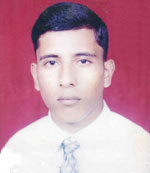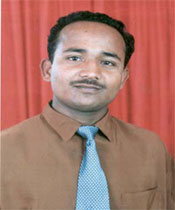Related Links
Case Updates
Krishna Adhikari
 On 6 June 2004, Krishna Prasad Adhikari, a resident of Fujel village of Gorkha District, was murdered in Chitwan District by Maoist cadres. Krishna Prasad was visiting his grandparents after having taken the SLC examinations, and he was abducted from Bakullahar Chowk by men who came on a motorcycle ...
On 6 June 2004, Krishna Prasad Adhikari, a resident of Fujel village of Gorkha District, was murdered in Chitwan District by Maoist cadres. Krishna Prasad was visiting his grandparents after having taken the SLC examinations, and he was abducted from Bakullahar Chowk by men who came on a motorcycle ... Maina Sunuwar
 Around 6 am on February 17, 2004, a group of RNA soldiers arrested Ms
Maina Sunuwar, a 15-year-old schoolgirl of Kharelthok VDC-6, Kavre
district. She disappeared since her arrest. Her family members, with
support from villagers and school where Maina was a student, visited
detention centers ...
Around 6 am on February 17, 2004, a group of RNA soldiers arrested Ms
Maina Sunuwar, a 15-year-old schoolgirl of Kharelthok VDC-6, Kavre
district. She disappeared since her arrest. Her family members, with
support from villagers and school where Maina was a student, visited
detention centers ... Sanjeev Kumar Karna
 Sanjeev Kumar Karna was one among the 11 persons arrested on October 8, 2003. On that fateful day, they had gone to attend a picnic program organized by the students at a place called Kariyachauri VDC-4, and from picnic, they went to Kataiya Chowri Area of Dhanusha district where they ate some food ...
Sanjeev Kumar Karna was one among the 11 persons arrested on October 8, 2003. On that fateful day, they had gone to attend a picnic program organized by the students at a place called Kariyachauri VDC-4, and from picnic, they went to Kataiya Chowri Area of Dhanusha district where they ate some food ... Arjun Bahadur Lama
Hari Prasad Bolakhe
Sarala Sapkota
Birendra Shah
Bishwanath Parajuli, Tom Nath Poudel and Dhan Bahadur Tamang
Chot Nath Ghimire and Shekhar Nath Ghimire
Bhauna Tharu
Nepal: Continued denial of justice for crimes relating to torture and ill-treatment – An independent mechanism needed to ensure prompt, thorough and effective investigations
Moreover, the impact of the ongoing COVID-19 pandemic on vulnerable groups, including detainees as well the victims of torture, has been enormous. Human rights organisations have documented increased cases of illegal detention because of the limited capacity of courts to scrutinize the legality of detention and lack of access for detainees to family members and lawyers. As a result of limited access to regular health care, the dire financial situation and rising uncertainty, the psychosocial health and well-being of victims of torture have further deteriorated.
The 1996 Torture Compensation Act (TCA), the first ever law relating to torture in Nepal, falls far short of international standards. Victims who resorted to this Act have not obtained justice due to its highly restrictive and flawed provisions. The criminalization of torture through the Penal Code, 2017 was a welcome step that raised some hopes for justice. However the fact that not a single case of torture has been successfully prosecuted under this Penal Code continues to cast doubt on Nepal's commitment to end torture and impunity in relation to torture. Prosecuting authorities often refuse to register First Information Reports (FIRs) on the allegations of torture or other ill-treatment against police officials in an attempt to protect their own colleagues.
As the past several decades have shown, the Nepal police refuse to self-police. Cognisant of the impunity for human rights violations committed by the security forces, the Supreme Court has recently ordered the Government to establish and independent mechanism to investigate and prosecute violations committed by the police. Thus, undersigned organisations call on the authorities to:
- Establish an independent mechanisms to ensure investigation and prosecution of all acts of torture;
- Ensure victims' right to an effective remedy;
- Ratify the Optional Protocol to the Convention against Torture and Other Cruel, Inhuman or Degrading Treatment or Punishment; and
- Stop using Covid-19 as a justification to illegally detain, inflict torture or ill-treat people.
























Join Us